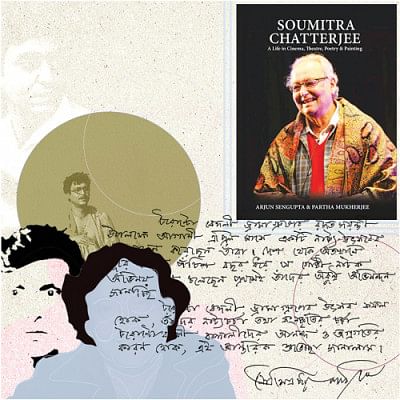Soumitra Chatterjee: The one man behind the many

It is impossible to ascribe any one particular character to Soumitra Chaterjee, as he has immortalised several through his performances. "It is perhaps his greatest achievement that when one thinks of the career of Soumitra, one does not think of any particular persona with a distinct style of delivery and mannerisms", Arjun Sengupta and Partha Mukherjee write in Soumitra Chatterjee: A Life in Cinema: A Life in Cinema, Theatre, Poetry & Painting (Niyogi Books, 2020).
Arjun Sengupta teaches on scriptwriting and the cinematic adaptation of literary works, and his co-author Partha Mukherjee is a freelance writer and experienced documentary filmmaker. It is both their extensive knowledge of cinema and literature which gives this book its shape, embellished with snippets of the writers' interviews with Soumitra Chatterjee, and the actor's own account on multiple perspectives.
The first few chapters explore Soumitra's childhood, his introduction to acting, how he came to meet thespian Shishir Kumar Bhaduri, and how he learned the artform and dedicated his soul to theatre. The intricate details of witnessing Bhaduri as Aurangzeb in the play Alamgir are discussed at great length, a performance that played a most pivotal role in Soumitra's life, forging a strong bond between the young actor and theatre, a bond that lasted a lifetime.
Born in a turbulent time for the Indian subcontinent, Soumitra's deep interest in socio-politics reflected widely on his personality and, later on, his acting. The book sheds light on Soumitra's political ideology and the influence of Tagore, among others, on his life.
Quite a few chapters are naturally devoted to Soumitra's profound relationship with Satyajit Ray. According to Chatterjee, Ray taught him everything he knew about cinema, and also critiqued his performances, directions, and theatre work. The author-filmmaker's strong personality and in-depth knowledge instilled in Soumitra the true integrity of not just an artist, but also an individual. "Ray had taught him to be an educated, well-rounded artist whose intellectual horizons would perhaps have never been as broad as they were under his paternal stewardship", the book asserts.
It further explores several of the actor's iconic portrayals in cinema and in theatre, discussing the techniques, challenges, and transformations Soumitra went through to perform. We find out that Soumitra always left a bit of himself in his roles. His performance as illiterate, hot-tempered Narsingh in Abhijan (1962) was perhaps his most challenging role, as it required him to portray someone different and contradictory to his own persona; Coach Khit Da in Kony (1984) was a measure of his own personality and his passion for sports; the role of a Brahmin villager in Ashani Sanket (1973) was his testament to a painful memory of famine; and his earnest performance in the semi-autobiographical theatre play, Tritiyo Onko Otoeb, was a reflection of his philosophies about death.
These milestones in Soumitra's life are accompanied in the book by the authors' reflections on cinematic trends, acting techniques, the lures of stardom, and the downfall of Bangali cinema over the years.
The final chapters reflect on Soumitra's persona as a passionate poet from early adolescence and an attentive painter in his free time—parts of his life not known to all. The book ends with an English translation of a lecture he once gave at a Sahitya Akademi programme in Kolkata, on November 6, 1990, in which he highlights the impact and influence of books in his life—the works of Shakespeare, Tolstoy, Jim Corbett, Sir Arthur Conan Doyle's Sherlock Holmes, Eric Maria Remarque's All Quiet on the Western Front, James Jean's The Mysterious Universe, Bibhutibhushan Bandopadhyay's Pather Panchali, and more.
Having read this book, as an avid fan of Soumitra Chatterjee, a person I knew only through films, I now feel like I know the artist as well as the man, and my admiration for both has only grown.
Rasheek Tabassum Mondira is a night owl who likes binge-watching, reading, and writing. Write to her at [email protected].

 For all latest news, follow The Daily Star's Google News channel.
For all latest news, follow The Daily Star's Google News channel. 



Comments